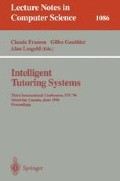Abstract
This report focuses on a problem within the area of Intelligent Tutoring Systems; that of analysing student's reasoning (student diagnosis). A novel approach to collecting information for this analysis, complementary to traditional student modelling techniques, is presented. This technique is based on using a Learning Companion, a computer based agent, as a collaboration partner to the student. In the dialogue between the student and the Learning Companion, information on their problem-solving process is revealed. This information would then be extracted and used for student modelling purposes. Analysis of the proposed solution is commenced in a small experiment and an explorative implementation described here.
Preview
Unable to display preview. Download preview PDF.
References
Brown, J. S., Burton, R., and de Kleer, J. Pedagogical, natural language and knowledge engineering techniques in SOPHIE I, II, and III. In Sleeman, D. and Brown, J. S., editors, Intelligent Tutoring Systems, chapter 11, pages 227–282. Academic Press, 1982.
Burton, R. R. and Brown, J. S. An investigation of computer coaching for informal learning activities. In Sleeman, D. and Brown, J. S., editors, Intelligent Tutoring Systems, chapter 4, pages 79–98. Academic Press, 1982.
Chan, T.-W. Integration kid: A Learning Companion system. In Proceedings of IJCAI'91, pages 1094–1099, Sydney, Australia, 1991.
Chan, T.-W. and Baskin, A. B. Learning companion systems. In Frasson, C. and Gauthier, G., editors, Intelligent Tutoring Systems: At the Crossroads of Artificial Intelligence and Education, pages 6–33. Ablex, New Jersey, 1990.
Chan, T.-W. and Chou, C.-Y. Simulating a learning companion in reciprocal tutoring systems. In Proceedings of Computer Supported Collaborative Learning (CSCL'95), on-line version, 1995. http://www-cscl95.indiana.edu/cscl95/chan.html (accessed Nov 7, 1995).
Corbett, A. T. and Anderson, J. R. LISP Intelligent Tutoring System: research in skill acquisition. In Larkin, J. H. and Chabay, R. W., editors, Computer Assisted Instruction and Intelligent Tutoring Systems: Shared Goals and Complementary Approaches, chapter 3, pages 73–109. Lawrence Erlbaum Associates, 1992.
Dillenbourg, P. and Self, J. A. PEOPLE POWER: A human-computer collaborative learning system. In Frasson, C., Gauthier, G., and McCalla, G. I., editors, Proceedings of ITS'92, pages 651–660. Springer Verlag, 1992.
Dillenbourg, P. J. Human-Computer Collaborative Learning. PhD thesis, University of Lancaster, Department of Computing, 1991.
Foner, L. N. What's an agent anyway? a sociolgical case study. Technical Report 93-01, Agents Group, MIT Media Lab, MIT Media Laboratory, 20 Ames St. Camebridge, MA 02139., 1993. Available via Foner's home page http://lcs.www.media.mit.edu/people/foner/ (as of 19th of March 1996).
Goodyear, P. and Tait, K. Learning with computer-based simulations: Tutoring and student modelling requirements for an intelligent learning advisor. In Learning and instruction: European research in an international context, pages 463–481, 1991. Proceedings of the 3rd conference of the European Assoc. for Research on Learning and Instruction, 1989.
Greer, J., Mark, M., and McCalla, G. Incorporating granularity-based recognition into SCENT. In Bierman, D., Breuker, J., and Sandberg, J., editors, Proc. of the 4th International Conference on AI and Education, pages 107–115, Amsterdam, 1989.
Holt, P., Dubs, S., Jones, M., and Greer, J. The state of student modelling. In Greer, J. E. and McCalla, G. I., editors, Student Modelling: The Key to Individualized Knowledge-Based Instruction, NATO ASI Series F, pages 3–35. Springer-Verlag, 1994.
Lesgold, A., Lajoie, S., Bunzo, M., and Eggan, G. Sherlock: A coached practice environment for an electronics troubleshooting job. In Larkin, J. H. and Chabay, R. W., editors, Computer-Assisted Instruction and Intelligent Tutoring Systems: Shared Goals and Complementary Approaches, chapter 7, pages 201–238. Lawrence Erlbaum Associates, 1992.
Markowitz, J. Keyword spotting in speech. AI Expert, pages 21–25, October 1994.
McCalla, G. The central importance of student modelling to intelligent tutoring. In Costa, E., editor, New Directions for Intelligent Tutoring Systems, pages 107–131. Springer-Verlag, 1992.
Newman, D. Is a student model necessary? Apprenticeship as a model for ITS. In Bierman, D., Breuker, J., and Sandberg, J., editors, Proc. of the 4th International Conference on AI and Education, pages 177–184, Amsterdam, 1989.
Nichols, D. Issues in designing learning by teaching systems. AAI/AI-ED 107, Computing Department, Lancaster University, Lancaster, LA1 4YR, UK, July 1994. Accessed via Internet, Sept. 1995. http://www.comp.lancs.ac.uk/computing/research/aai-aied/.
Nwana, H. S. User modeling and user adapted interaction in an intelligent tutoring system. User Modeling and User-Adapted Interaction, (1):1–32, 1991.
Ragnemalm, E. L. Towards student modelling through collaborative dialogue with a learning companion. Licentiate thesis Thesis No 482, Linköping University, 1995.
Ragnemalm, E. L. Student diagnosis in practice; Bridging a gap. User Modelling and User Adapted Interaction, 5(2):93–116, 1996.
Schaafstal, A. M. Diagnostic Skill in Process Operation: A Comparison Between Experts and Novices. PhD thesis, University of Groningen, Institute for Perception TNO, P.O. Box 23, 3769 Soesterberg, The Netherlands, September 1991.
Twidale, M. Intermediate representations for student error diagnosis and support. In Bierman, D., Breuker, J., and Sandberg, J., editors, Proc. of the 4th International conference on AI and Education, pages 298–306, Amsterdam, May 1989.
VanLehn, K. Student modeling. In Polson, M. C. and Richardson, J. J., editors, Foundations of Intelligent Tutoring Systems, chapters, pages 55–78. Lawrence Erlbaum Associates, 1988.
Weizenbaum, J. ELIZA — a computer program for the study of natural language communication between man and machine. Communications of the ACM, 9(1):36–45, 1966.
Woods, D. D. Process-tracing methods for the study of cognition outside of the experimental laboratory. In Klein, G. A., Orasann, J., Calderwood, R., and Zambok, C., editors, Decision-Making in Action: Models and methods, chapter 13, pages 228–251. Ablex publishing, 1993.
Author information
Authors and Affiliations
Editor information
Rights and permissions
Copyright information
© 1996 Springer-Verlag Berlin Heidelberg
About this paper
Cite this paper
Ragnemalm, E.L. (1996). Collaborative dialogue with a learning companion as a source of information on student reasoning. In: Frasson, C., Gauthier, G., Lesgold, A. (eds) Intelligent Tutoring Systems. ITS 1996. Lecture Notes in Computer Science, vol 1086. Springer, Berlin, Heidelberg. https://doi.org/10.1007/3-540-61327-7_165
Download citation
DOI: https://doi.org/10.1007/3-540-61327-7_165
Published:
Publisher Name: Springer, Berlin, Heidelberg
Print ISBN: 978-3-540-61327-5
Online ISBN: 978-3-540-68460-2
eBook Packages: Springer Book Archive

